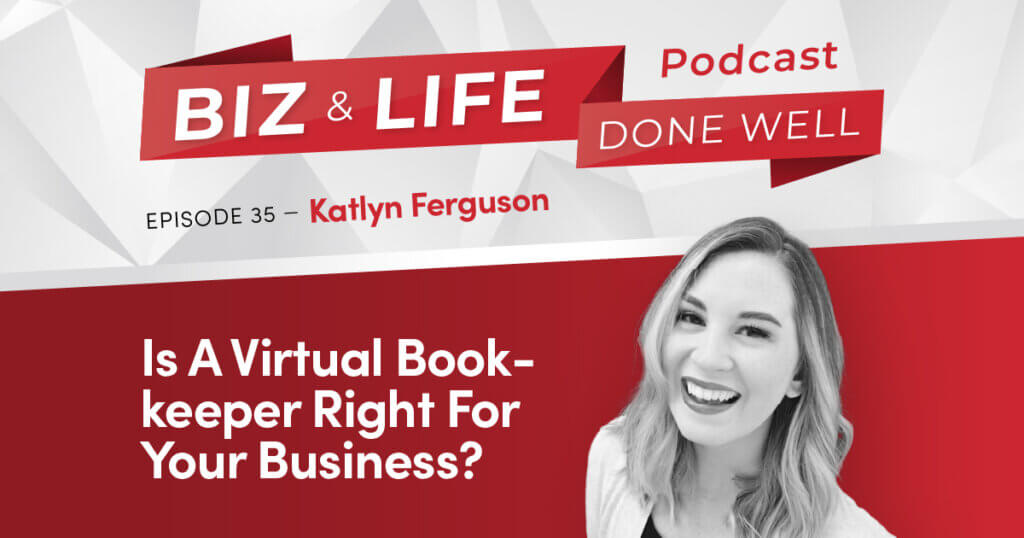Title: Katlyn Ferguson – Is A Virtual Bookkeeper Right For Your Business?
Guest: Katlyn Ferguson
Peter: Welcome to the Biz and Life Done Well podcast, where we explore what it means and what it takes to do business and life well. I’m your host, Peter Wilson. If you’re like me, you’re intrigued by stories of common people who have achieved uncommon success in business and life. Join me as I interview fascinating people about how they got started, their successes and failures, their habits and routines, and what inspires them. Today, my guest is Katlyn Ferguson of Citizen Virtual Business Services.
Katlyn: Hello.
Peter: I’m really curious kind of about your journey getting to become a a bookkeeper. Like, what what what where did you get how’d you get here?
Katlyn: That’s a good question because I didn’t start off as a bookkeeper, but, I used to work actually in the medical dental field. I worked in a dental office for about ten years. And slowly over the course of that ten years, I had worked myself into essentially almost like a financial, I was doing the financial planning. I was doing, you know, treatment planning with clients. I was preparing everything to hand off to the bookkeeper at the end of the month, essentially, kind of that in office contact.
And, I was also, managing my husband’s business. He’s a local musician, and so I was doing his bookkeeping. Mhmm. And and so when I was thinking about transitioning out of working in the medical dental field, I had at that point started to think about some things that I could do. And bookkeeping kinda came to my mind and I started thinking about it more and realized that part of what I was already doing with my other profession was bookkeeping.
Mhmm. So it wasn’t a huge transition. It was just learning a little bit more about some of the ins and outs in the daily aspects of bookkeeping. But Mhmm. That’s really how I came to form my own bookkeeping firm and start taking on private clients to help with their virtual bookkeeping.
Peter: So, you had some training along the way. Yes. Obviously, you’re selling you’re self taught, but you probably had was there any formal training?
Katlyn: Yeah. I took a really extensive bookkeeping course. Mhmm. That’s really, pretty, like, acclaimed in the bookkeeping community. So I took that course.
And then, of course, you can’t learn every single thing that could possibly come up in any situation. So a lot of it is learned, you know Yeah. In real time. So but those, you know, the accounting theories and, learning your debits and your credits and what an asset is versus, you know, those little accounting terms that I geek out over that most people won’t. Those were taught during that course.
Peter: Got it. Mhmm. So what is an ideal candidate for virtual bookkeeping and specifically your services? Like, what what sort of things are you looking for? Who can you help the most, I guess?
Katlyn: Absolutely. Yeah. I think, you know, there’s some types of businesses and certain sizes of businesses that would not fit into that ideal category. But for the most part, small to midsize service oriented businesses are probably the most ideal. Mhmm.
When you’re thinking about, you know, I know a lot of virtual bookkeepers bookkeepers do work with retail and restaurants. That’s not my ideal client. Mhmm. I typically find that there has to be somebody within that organization that is working very closely with you or you have to be on-site for certain things.
Peter: Mhmm.
Katlyn: And that’s just not how I wanted to set up my my firm. But those small to mid sized businesses that are in those service oriented, industries. Right. So, you know, you could think of, you know, digital marketing
Peter: or Professional services.
Katlyn: Professional services. Home
Peter: contractor home service contractors. Like,
Katlyn: construct some construction Uh-huh. Type businesses, even medical dental services could be really great. Where it gets into, like, inventory and things like that, that’s where I kind of, draw the line. And I say that’s not really for me
Peter: Right.
Katlyn: Just because of the way I’ve set up my firm. So
Peter: it seems to me that, you know, given the year we just went through, that we’re all virtual now. So Right. You know, you’re gonna work with a bookkeeper. You’re probably, unless you have, like, a huge staff, you’re probably gonna be working virtually with somebody. Right?
I mean, that just
Katlyn: Yeah.
Peter: I mean the way it’s going.
Katlyn: All of us kind of went virtual this last year. Right? So Yeah. Those of us who created a business that was oriented on being virtual really didn’t have much to change.
Peter: Right. Indeed. Yes.
Katlyn: But those who are working with staff bookkeepers, they were going virtual as well even during that time.
Peter: Mhmm. Yeah. So what are some of the benefits that you see in terms of working with you in particular and maybe just generally a virtual bookkeeping company?
Katlyn: Well, I don’t like to toot my own horn too much, but I think I’m a pretty fun person. So that’s one thing.
Peter: Indeed. Indeed.
Katlyn: I do like to make sure that, you know, when I’m talking to my clients who are business owners, first and foremost, that, what I’m saying actually, like, gets through. And that doesn’t mean talking in accounting terms, know, 100%. We’re making it realistic and understandable. So that involves kind of figuring out ways of talking to the business owner that makes it fun and makes it, you know, a little bit different than just sitting down and be like, okay. I guess I have to, like, sit down with my bookkeeper and go over these numbers.
You know? We try and make it. Yeah. Try and make it, like, a little bit more, you know, realistic. And, but, you know, working with a virtual bookkeeper, if you’re working with the right person, they’re gonna be organized.
They’re gonna be able to, speak with you on your level. They’re gonna be able to apply, information specific to your business. Mhmm. So, you know, what you’re doing versus what somebody else in your industry, those two things might be a little bit different. And so and your goals are always going to be different one business owner to the next, even in the same industry.
And so that’s something that I try and really take into account. It’s not just, you know, okay. There’s a $100 here and $500 there, and then payroll is this much and, you know, x, y, and z. It’s really like what do all these things mean for your future in the business and
Peter: So what your overall goals are yeah. That’s that’s, one of the things that you bring up because we keep a running tally of goals, and I’m even throwing out maybe some potential clients that we’re gonna sign up. And then, you know, every time we meet once a month, you’re like, where are you at with that one?
Katlyn: Yeah. It’s kind of an accountability thing. And Yeah. You know, most bookkeepers probably aren’t gonna go that far, but I enjoy that aspect of Yeah. That relationship.
Yeah. And so it’s something that’s important to me, and I find that most of the time, it’s also, you know, really important to the business owner too.
Peter: So one of the things you know, speaking of organized, you know, what one of the sort of, I guess, more recent changes or, things that’s happened not recent, but maybe in the last decade. You know, most of us have gone paperless now. Right? So that’s really changed the equation. Right?
Katlyn: Because Right.
Peter: There’s no it opens up the world for a lot of businesses to work with a virtual.
Katlyn: Absolutely. Yeah. The accounting world has changed so much just in the last twenty years. I mean, there’s bookkeepers out there right now who worked on a paper ledger. You know, they had their debits and their credits and they had, you know and then that turned into Excel spreadsheets and then that turned into very basic forms of accounting software.
And now here we are with these very virtual aspects of bookkeeping software that can allow you to go paperless Mhmm. Which is just kind of like the direction the world is going in.
Peter: Right. Well, the other thing I like is that the for the most part, the bank connects to the accounting. Mhmm. You know? And this is kinda basic stuff now, but Right.
You know, you’re able to reconcile the statements and things like that.
Katlyn: You can keep your receipts all Yeah. In the same place. I mean, that was one huge thing when everything was paper is like you have to keep your bank statements, you have to keep all your receipts in a shoebox under your bed for seven years and, you know, all of your invoices and all that stuff. Like, that’s just boxes and boxes of paperwork that now can just be stored in the cloud.
Peter: Right. That’s excellent. So, with respect to the paperless, you know, you’ve got all these different platforms. So are there any specific ones that you work with for your clients? I know we’re on QuickBooks Online.
Mhmm. So there but you also worked with our FreshBooks for invoicing. So what are the kinds of the the the platforms that you work on?
Katlyn: Yeah. That’s a good question because there’s a lot. Because each industry has some of their own kind of niche types of softwares. So QuickBooks Online is typically the accounting software that I prefer. There’s also an accounting software called Xero.
Yep. I I don’t have any yeah. It’s x e r o. Yeah. I don’t have any clients in that software, but I I kind of feel like it’s better to be a master of one instead of a jack of all trades.
Peter: Right.
Katlyn: So for me, QuickBooks is kind of my go to. Like you said, FreshBooks is an invoicing software in, you know, the construction world. There’s Buildertrend, there’s JobNimbus, there’s Housecall Pro, there’s Jobber. There’s all different kinds of invoicing, softwares available.
Peter: Work tracking.
Katlyn: Yeah.
Peter: Appointment tracking.
Katlyn: Exactly.
Peter: Invoicing.
Katlyn: And that’s all dependent on what the client wants and what, you know, how they do their billing or how they want to schedule their appointments. I also use, like a client, CRM called Financial Sense. That’s what my firm uses to receive information and keep track of things. So there’s lots of different kinds of softwares that we’re using to interact with the client, but also to help them keep on top of their books. You know?
Peter: So do you ever run into a case where you’re working with a construction client, and they don’t really know what their costs are associated to, like, a job?
Katlyn: Right. Yeah.
Peter: So what what kind of things have you been able to sorta any stories there? You’ve been able to help some Yeah.
Katlyn: So I actually have a client right now who, has been invoicing he he started his business just just this last year back in I think September. And, the invoicing structure that had been set up was working but it wasn’t exactly how he would like to see it. And, you know, the way that he described it to me, there really almost isn’t just one system that would fit all of those
Peter: Oh, okay.
Katlyn: But we did explore a few different options and a few different things that could work for him. But ultimately, what we kind of came down to was within QuickBooks Online, there’s a feature that’s really great for construction workers and those who wanna track by project. Okay. And you can do your estimates out of it and then attach the in you know, turn that into invoice and then start to track all your costs. You can track payroll.
You can track your
Peter: Oh, wow.
Katlyn: You know, your, employee’s hours. You can track bills, all sorts of things, and then it will spit out a profit margin. Margin. It’s one of those things where if you’re able to keep up on it
Peter: Yeah.
Katlyn: You know, for him, we had to move from a weekly to a daily situation Yeah. Because of the growth of his business and how many clients he had going. But that was a really great solution solution for him. Mhmm. In the end, that’s working out pretty well.
Peter: So one of the things you talked about was a cleanup service.
Katlyn: Yeah. Yeah.
Peter: Bookkeeping cleanup. So what is this? Somebody comes to you with a shoebox full of receipts and says help or what?
Katlyn: Sometimes. Yes. Cleanup can really kind of in, encompass a few different things. So, a lot of times when people start their business, they do their own bookkeeping.
Peter: Mhmm.
Katlyn: And it’s simply just a matter of math. Like if you’re bringing in a certain amount of money, but you have to spend it to get a bookkeeper, like you’re not making anything. So Yeah. Typically early on people aren’t really working with a bookkeeper and and they’re doing it themselves or, one of the things I see very often is like, my wife has been handling the books for me for the last five years, or my husband, or my cousin, or Mhmm. And they’re not a professional.
They’re just Oh. Kind of they googled whatever
Peter: it Kinda winging it.
Katlyn: Yeah. And while sometimes that has been fine, most of the time we see a lot of errors. Mhmm. And so the cleanup would be going back through all those records and just making sure that they’re actually accurate. And we see a lot of problems and I don’t need to go into all the nitty gritty details of what could potentially go wrong.
But, a lot of times we see a lot of problems there and then taxes need to be amended or things like that. So, that’s kind of the cleanup process. There’s a lot involved
Peter: pay b and o tax.
Katlyn: Right. Right. Exactly. You have Washington State or other states. We’re in Washington State, but, you know, state department of revenue taxes.
Right. There’s a lot of different things that can go wrong if you’re not doing it So
Peter: when somebody comes to you and they need to clean up, they’re I’m guessing they’re kinda desperate.
Katlyn: Yeah. Typically, what’s happened is they’ve been audited, or they’ve realized down the line that something was wrong, in a report or something like that. And then they look back and they see, oh my gosh. We’ve been doing this wrong for X amount of months or X amount of years. Yeah.
And they don’t really know how to fix it. Mhmm. Or they don’t have the time to do it. Right. So, a lot of people when they do a cleanup, they end up either it’s kind of unfortunate, but they either owe more taxes or a lot of times what we see is that the government owes them tax, you know, a tax return because they weren’t taking advantage of all the deductions they could have gotten.
So I mean, could go both ways.
Peter: Right.
Katlyn: We’ve you know, I’ve heard from friends in the industry that they’ve saved their business owners thousands of dollars in tax refunds and things like that.
Peter: So Let’s get going. Yeah. One of the other things I wanna touch on is you work with accountants as well. Right? So Yeah.
That’s sort of a sign of a good bookkeeper is Yeah. So what tell me about that side of things. How does that work?
Katlyn: Well, do my best to stay in my lane. So I don’t do federal taxes Yeah. Or anything like that. I leave that to the tax accountants because, like I said, I don’t wanna be a jack of all trades. I wanna be a master at the one.
So, what’s easiest for me is if somebody has a trusted tax accountant that they’ve worked with for many years and many of my clients have worked with their tax accountant for a long time, they have a great relationship with them. It’s easier for me to just try and come in and make friends with the tax accountant, get on the same team. We’re both working towards, you know, the betterment of the business. Mhmm. And so kind of playing tag team and just making sure that everything is covered so that the business owner really doesn’t have to worry about anything from either the tax perspective or the record keeping, which is mostly the bookkeeping stuff.
Peter: Well, because I know a lot of, CPAs will say, you know, we don’t do bookkeeping.
Katlyn: Right.
Peter: And then they end up doing bookkeeping because they have some clients who
Katlyn: Right.
Peter: Refuse to hire somebody.
Katlyn: Right. And many CPAs and many tax accountants are, pretty familiar with bookkeeping, but most of the time, they’re not. And so it’s it’s, it’s different. You know? Bookkeepers are typically going to go pretty molecular pretty detailed.
Whereas a tax accountant or a CPA might just make a couple entries just to get the information on the books. Mhmm. But you don’t have a lot of that historical data to refer back to. So, you know, I I don’t say yay or nay one way or the other, but that’s one thing that I think for bookkeeping, it’s, you get that detail, and then you can make good decisions based on that information.
Peter: Got it. So one of the things well, if somebody wants to get ahold of you, I know you have a website, citizenvirtual.com.
Katlyn: Yes.
Peter: So if I’m gonna work with you, what is what is that process like?
Katlyn: Well, the first thing that we wanna do is we wanna set up some sort of an appointment where we can chat. Yeah. Because I wanna make sure that I’m a good fit for the business owner and that they’re a good fit for me. So I always offer a free thirty minute, bookkeeping consult and review. Okay.
So what that looks like is we’ll have a thirty minute conversation about all the details of your business and what you’re looking for and what you need. And then what I will do is I will request access to your current bookkeeping software and I’ll do a thorough review of what you have in there. So by the time we’re meeting for a proposal Yeah. I’ve already established what you want and what you think you need. And then I’ve also been able to look at the books and I can make recommendations based on what I’m seeing.
Peter: Mhmm.
Katlyn: So, it’s kinda it’s pretty thorough. And and and the whole time, we’re just trying to make sure, like, are we a good fit for each other? You know, do we communicate well? Right. Do we, you know, understand each other?
Peter: Mhmm.
Katlyn: Those are fundamental aspects of having a good relationship with anybody you’re working with. Especially when it comes to the books, I think it’s important to
Peter: It’s money.
Katlyn: Yeah. And, you know, we just we wanna make sure that that is a trusted relationship.
Peter: Right.
Katlyn: That builds with time. Right. But even right off the bat, we wanna make sure, like, you know, that there’s some trust there.
Peter: It it it’s interesting because I was talking to my wife who works at a dental practice Yeah. Who said that, you know, there are two things that people are dealing with at the dental practice. It’s pain and money. Right. Very A lot of emotion tied to those two Yes.
And in your case, money. And as a business owner, we work so hard to earn it and to get it, and we just want, you know, we want everything to be right.
Katlyn: Right.
Peter: And we wanna get our fair share of what we’ve earned. Right?
Katlyn: Yeah. And I mean, it’s unfortunate, but as business owners, we’re taxed on so many different levels. And and so when you can get, a better tax deal because you’ve put everything there that should be there Yeah. Then I think that’s really worth it.
Peter: Pays for itself.
Katlyn: Over time, it does. Yeah. And I like to say, you know, bookkeeping is less an expense to the business and more like an investment. Mhmm. Like, you’re investing in the financial health of your business.
Peter: Mhmm.
Katlyn: You know, just blindly going through and not really looking at things or trying to understand what’s going on. I feel like is kind of just like ignoring a little wound, you know, and over time, maybe it gets a little bit bigger, a little bit. And then by the time, you know, it’s too late, it’s like, wow. This is gonna be a big thing. But investing in it a little bit at a time saves you a lot of grief
Peter: in the long The one thing that I really appreciate is working with you virtually, but I always work with you, and I do know you have some new folks, that are helping you out. Mhmm. I did go sort of the other extreme with a national virtual bookkeeping company, and it was a nightmare.
Katlyn: Yeah. I find that a lot. When people come to me, they’ve typically been passed around one person to the next, and they never know who they’re supposed to call. They never know when they’re allowed to call or
Peter: Well, they have to you have to educate the person you’re talking to on the phone every Yeah. Dang. It’s like they don’t have any They don’t have history. Yeah. No history, no institutional knowledge of your business.
Katlyn: Right.
Peter: So
Katlyn: They might be book smart in that they know the technical aspect of bookkeeping.
Peter: Sure.
Katlyn: But they don’t know you. They don’t know your business. It’s not individualistic.
Peter: Right.
Katlyn: And I think that’s kind of a shame sometimes. I mean, I get it why people go that way. And for some people, it works fine.
Peter: Right.
Katlyn: But for the people who want something a little bit more, that’s what I’m here for.
Peter: Right. So Caitlin Ferguson
Katlyn: Yes.
Peter: Citizenvirtual.com.
Katlyn: Yes.
Peter: Her contact information is on her website. This has been a great conversation.
Katlyn: Yes. It’s been great. Thank you.
Peter: Thank you, Caitlin. So, maybe next time, we can talk about something like Profit First.
Katlyn: Oh, that’d be great. I love Profit First. Cool.
Peter: Well, we’ll, we’ll taunt you all with that and save it for another conversation.
Katlyn: Sounds great. Thanks, Peter.
Peter: Thanks for listening to this episode of Biz and Life Done Well with Peter Wilson. You can subscribe to us on iTunes, Google Podcasts, Spotify, and most of the other popular podcast platforms. Please tell your friends about us and leave us a review so even more people will find out about us. Thanks again. We’ll see you soon.



